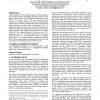Free Online Productivity Tools
i2Speak
i2Symbol
i2OCR
iTex2Img
iWeb2Print
iWeb2Shot
i2Type
iPdf2Split
iPdf2Merge
i2Bopomofo
i2Arabic
i2Style
i2Image
i2PDF
iLatex2Rtf
Sci2ools
107
Voted
FPGA
2009
ACM
2009
ACM
FPCNA: a field programmable carbon nanotube array
Carbon nanotubes (CNTs), with their unique electronic properties, are promising materials for building nanoscale circuits. In this paper, we present a new CNT-based FPGA architecture known as FPCNA. We define novel CNT and nanoswitch based components and characterize these components considering nanospecific process variations, including the variation caused by the random mixture of metallic and semiconducting CNTs. To evaluate the architecture, we develop a variation-aware physicaldesign flow which can handle both Gaussian and non-Gaussian random variables using variation-aware placement and routing. When FPCNA is evaluated with this CAD flow, we see a 2.67× performance gain over a baseline CMOS FPGA at the same technology node (at a 95% performance yield). In addition, FPCNA offers a 4.5× footprint reduction compared to the baseline FPGA. These results demonstrate the potential of using CNTs and nanoswitches to build high performance FPGA circuits. Categories and Subject Descripto...
Baseline Cmos Fpga | CNT-based FPGA Architecture | FPGA 2009 | Hardware | Performance Fpga Circuits |
Related Content
| Added | 19 May 2010 |
| Updated | 19 May 2010 |
| Type | Conference |
| Year | 2009 |
| Where | FPGA |
| Authors | Chen Dong, Scott Chilstedt, Deming Chen |
Comments (0)

